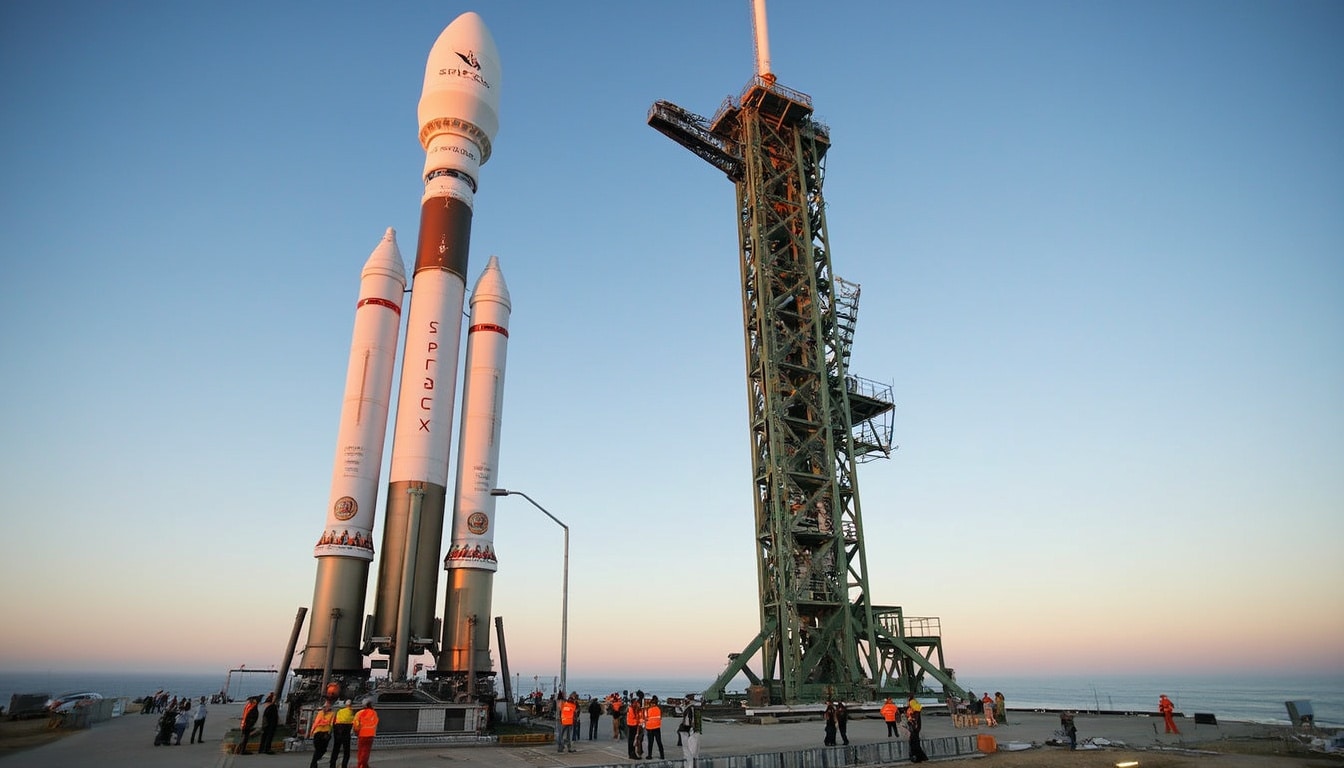Excitement is building in the world of space exploration as SpaceX gears up for its third launch in just eight days, this time for the National Reconnaissance Office (NRO). Scheduled for April 20, the NROL-145 mission will continue to enhance the United States’ capabilities in low Earth orbit with a new batch of satellites. Built in collaboration with Northrop Grumman, these satellites are pivotal for the proliferated architecture constellation the NRO is developing.
In this article, we will delve into the details of the upcoming launch, the growing significance of the NRO’s missions, and the technological advancements surrounding SpaceX. From the critical preparations at Vandenberg Space Force Base to the role of major players like Boeing, Lockheed Martin, and Blue Origin, we will cover various aspects that make this launch particularly noteworthy. Let’s embark on this journey to uncover the latest in the realm of satellite technology and the future of space exploration.
The Countdown to NROL-145 Launch
The NROL-145 mission represents a significant leap in the ongoing efforts of the NRO to enhance its surveillance capabilities. Scheduled for liftoff from Space Launch Complex 4 East (SLC-4E) at Vandenberg Space Force Base, this mission is indicative of the NRO’s aggressive pace in deploying its satellite constellation. The launch is targeted for 5:29 a.m. PDT (8:29 a.m. EDT, 1229 UTC) and will utilize the workhorse Falcon 9 rocket.

Mission Overview and Objectives
The upcoming NROL-145 mission is crucial not only for its intended objectives but also for showcasing the reliability of SpaceX as a launch provider. With the Falcon 9 rocket slated for its 12th flight, this particular mission will also mark the 10th launch dedicated to the proliferated architecture constellation. The connection between SpaceX and the NRO signifies a strong partnership in addressing the nation’s security concerns through advanced technology.
One of the significant aspects of this mission is the inclusion of a new batch of Starshield satellites, which are expected to bolster the NRO’s capabilities in reconnaissance and surveillance. Responding to the contemporary security landscape, these satellites will contribute to a more resilient and secure architecture in low Earth orbit. The ongoing commitment to enhance capabilities is a reflection of the strategic priorities of both the NRO and its industry partners, such as Northrop Grumman.
Recent Developments in Space Launches
In the past week, the pace of launches by SpaceX has been breathtaking. This upcoming mission follows closely behind two other significant launches: NROL-192, which successfully placed 22 satellites into orbit, and the NROL-174 mission, which was executed just days before. This sequence underlines not only the operational efficiency of SpaceX but also the increasing demand for satellite capabilities.
The Strategic Importance of NRO Missions
The National Reconnaissance Office plays a crucial role in national security by ensuring that the U.S. has access to timely and reliable intelligence. As geopolitical tensions rise globally, the need for advanced reconnaissance has never been clearer. The satellites being launched in these missions provide vital information that supports military operations and strategic decision-making.
By relying on companies like SpaceX, the NRO ensures that it can quickly adapt to the changing landscape of space operations. The capability to launch multiple missions in rapid succession allows for a more responsive approach to national security. This flexibility in the launch schedule is complemented by the advancements in rocket technology provided by SpaceX, which has revolutionized how we approach space exploration.
The Future of Satellite Launches
As we look ahead, the future of satellite launches is becoming increasingly exciting. The emergence of new contenders in the space industry is reshaping how missions are planned and executed. While SpaceX has been a dominant force, competitors like Rocket Lab, Virgin Galactic, and Blue Origin are also making strides to capture a share of the growing market.

Technological Innovations Leading the Way
Innovations in spacecraft technology are becoming a focal point of the ongoing competition. From reusable rocket technology pioneered by SpaceX to the advancements in launch systems by others in the industry, the emphasis is firmly placed on reducing costs and increasing the frequency of launches. The future may see even more state-of-the-art satellites making their way into orbit, each serving specific roles in intelligence gathering, telecommunications, and more.
Partnerships between government agencies and private industry leaders are essential for pushing the boundaries of what is achievable in space. The collaborative efforts among organizations such as NASA and Boeing showcase the potential for groundbreaking advancements in future missions. Moreover, the European Space Agency (ESA) is seeking to collaborate with American firms to further enhance their capabilities and foster innovation.
The Role of Industry Collaboration
Collaboration between private and government entities continues to be a cornerstone of America’s space strategy. As we have seen with Northrop Grumman, partnerships not only enhance mission capabilities but also foster innovation across the board. By pooling resources and expertise, companies are better positioned to meet the demands of modern spaceflight.
Significant Industry Players and Their Impact
In recent years, we have witnessed how significant players such as Lockheed Martin and Dynetics have sharpened their focus on developing advanced missile defense systems and satellite technologies. This evolution emphasizes the growing importance of technology readiness and responsiveness in defense capabilities. Moreover, as cybersecurity also comes to the forefront, initiatives to secure satellite missions are paramount. SpaceX, in partnership with NRO, has initiated programs to challenge hackers and enhance security, ensuring that our space assets are safeguarded.
As competition intensifies, the industry must adapt and embrace innovative approaches. Projects like these are not merely about launching satellites but signify a collective effort to uphold security and technological leadership. With strategic priorities shifting, we can expect to see even deeper collaborations among industry leaders, resulting in groundbreaking missions that define the future of space exploration.
With the upcoming NROL-145 mission, SpaceX continues to affirm its position as a leader in the aerospace industry while also fulfilling a critical role in national security. As the launch day approaches, anticipation abounds regarding the capabilities these satellites will bring to the forefront. Stay tuned for the launch details as we celebrate the achievements of modern space endeavors!
| Launch Date | Mission Type | Rocket Used | Status |
|---|---|---|---|
| April 20, 2025 | NROL-145 | Falcon 9 | Upcoming |
| April 12, 2025 | NROL-192 | Falcon 9 | Successful |
| April 16, 2025 | NROL-174 | Minotaur | Successful |




Leave a Reply